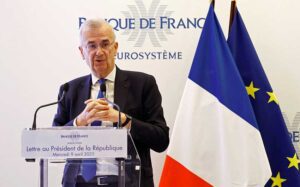Tariff suspension ‘marks return to economic sense’, says Bank of France governor
Bank of France governor hails Trump’s tariff suspension as a return to economic sense but warns of ongoing unpredictability and protectionism. EU leaders urge unity ahead of trade talks. Read more: Tariff suspension ‘marks return to economic sense’, says Bank of France governor


President Trump’s surprise decision to suspend higher tariffs on most countries has been cautiously welcomed by European leaders and central bankers, with the Governor of the Bank of France calling it the “beginning of a return to economic sense”.
François Villeroy de Galhau praised the move as a step in the right direction, while warning that two key challenges remain — the unpredictability of US trade policy and the persistent trend towards protectionism.
Speaking on France Inter radio, he said: “Let’s say it’s less bad news. But there are still two bad ingredients: the unpredictability, which is always the enemy of confidence and growth, and the protectionism.”
He described the broader direction of Trump’s trade strategy as an “own goal” that risked undermining US economic growth and, to a lesser extent, European markets.
Villeroy de Galhau commended EU member states for their composure and unity in the face of uncertainty:
“Those qualities are going to be needed during the negotiations that are going to open. There’s no need to be paralysed and to be passive in the face of what is coming. Europeans must stick together and negotiate well.”
The US had previously announced a 20 per cent tariff on goods from the EU, including Ireland, but this week softened its stance, imposing only a 10 per cent baseline tariff for at least the next 90 days, excluding China, which now faces a 125 per cent rate.
Dialogue ‘likely’ following de-escalation
Ireland’s Tánaiste, Simon Harris, said negotiations with the United States are now “likely” in light of the partial suspension.
“It has been my consistent position, and the consistent position of the Irish government and the European Union, that we need to get into substantive, calm, measured dialogue with the United States,” he said in a statement on Thursday.
He added: “It has always been our preference that that would have happened before tariff announcements. Clearly that was not the position of the United States.”
The de-escalation follows weeks of rising global tension, with stock markets volatile and business confidence shaken by fears of a prolonged trade war.
President Trump’s administration said the tariff pause was designed to allow countries to negotiate better trade terms, with Treasury Secretary Scott Bessent warning that only those who refrain from retaliation will benefit from potential concessions.
European leaders and business groups are now preparing for intense trade discussions, with calls for unity, strategic negotiation, and a renewed commitment to open markets guiding the bloc’s approach in the weeks ahead.
Read more:
Tariff suspension ‘marks return to economic sense’, says Bank of France governor





















